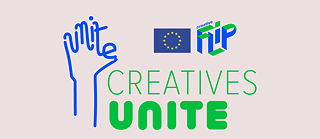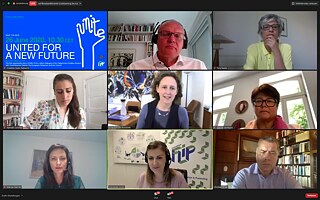Online Conference “United for a New Future”
Out of the Crisis into the Future

The Goethe-Institut is strengthening its European commitment for Germany’s EU Council Presidency. A few days before the start of the council presidency, at the “United for a New Future” conference, cultural and creative professionals sought ways out of the crisis together with the European Commission, the European Parliament, and the EU Council.
By Tanya Wittal-Düerkop and Benjamin Panten
The Federal Republic of Germany is taking on the EU Council Presidency on 1 July and opening a European cultural programme with a focus on the European public sphere and European solidarity. The Goethe-Institut’s contribution to the Federal government’s cultural programme explores the questions: What will constitute Europe in future and how can European cohesion succeed even during the coronavirus pandemic? With discourse and art, the Goethe-Institut’s Europe-wide projects are devoted to the diversity of Europe and the creation of a common European public sphere. Johannes Ebert, secretary-general of the Goethe-Institut, said, “Especially now, when the European Community is severely affected by Covid-19 and nation-state thinking is on the rise, our projects aim at strengthening the European public sphere in order to enable cohesion and solidarity at European level.”
A few days before the start of the German EU Council Presidency, he opened the conference with an urgent appeal to policy-makers. He said that he perceives the coronavirus crisis not just as disruptive, but also a guiding light for pressing ahead with a new value-based, sustainable, and innovative policy for the European cultural and creative sector. “In recent months, transnational creative and cultural initiatives have emerged that inspire us and create new freedoms during this standstill in public life. The European Commission and the European Parliament have developed strategies since the beginning of the crisis; have quickly provided funding. I hope that in the new multiannual financial framework, the cultural ecosystem will be given adequate financial resources as a booster for innovation and cohesion. Nothing less than the survival of our cultural diversity is at stake. There is no better way to plan and shape than together. There is no better moment for this than now.”Existential threat to the industry
The cultural and creative industries are among the sectors that have been particularly hard hit by the pandemic across the EU. Financially, it is an existential threat to the industry. Lockdown measures not only meant the loss of income and destruction of jobs, but also of public awareness, in many cases even of appreciation. The conference therefore addressed the diverse challenges and difficulties that cultural and creative professionals are currently facing.
In her opening speech, Mariya Gabriel, Commissioner for Innovation, Research, Culture, Education and Youth, emphasised the importance of the Creatives Unite platform. Since May 2020, it has been coordinated jointly by the Goethe-Institut and the European Creative Hubs Network (ECHN) as part of the EU-funded “Creative FLIP” project. The platform gathers a variety of current initiatives and information about the effects of the pandemic on the cultural and creative sector for actors inside and outside the EU. “The cultural and creative sector in particular, with its innovative strength, creativity, and diversity, is standing up to this crisis,” said Mariya Gabriel. “Finding ways out of the crisis together, further strengthening the industry, and providing future-proof instruments is what I see as my mission.”
Croatian Minister of Culture Nina Obuljen-Koržinek emphasised the importance of the conference and the exchange platform, noting, “It is crucial for us policy-makers to listen, to support the ideas of the cultural and creative professionals, and to develop suitable measures at national and EU level.”

Developing sustainable financing models for the sector
Sabine Verheyen, chair of the European Parliament’s Committee on Culture and Education, sharply criticised the European Commission’s recent cuts in education and culture programmes in the new revised proposal for the 2021-2027 EU budget. She noted that funding needs to be increased for the cultural and creative scene, which has been one of the hardest hit, as has been negotiated for other programmes. After all, with about four percent of the gross domestic product, the sector contributes to the total economic output in the EU.
Johannes Ebert is also opposed to budget cuts. He said, “We are at a very crucial moment for the negotiations of the future Multiannual Financial Framework (MFF) which could offer a unique opportunity to put in place a plan to help the cultural and creative sector to recover from the crisis. The Goethe-Institut strongly advocates for the needs of the sector to be taken into account in the new generation of EU programmes and shares the concerns expressed by the sector about the recent reduced proposal for the budgets of ‘Creative Europe’, the ‘Solidarity Corps’ and ‘Erasmus +.’”
Perspectives for Europe’s cultural and creative scenes
Christian Ehler, a member of the European Parliament, is calling for fundamental structural change in the economy in general after the coronavirus pandemic. For the cultural and creative industries in particular, he would like an economic stimulus programme equivalent to that for other branches of industry, not just state transfer payments or liquidity aids. This is the only way to really strengthen the sector, preserve jobs, and even create new ones. The actors in the sector should not be assigned the role of victim only, on the contrary, they should be seen as part of the solution and response to the crisis, said the MP. This requires two things from policy-makers: planning security and genuine perspectives for Europe’s cultural and creative scene.
